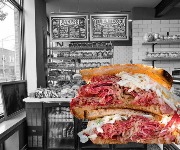Why I've absolutely had enough of fine dining!

Food writer and broadcaster Tim Hayward tells us why the influence of smears and foams won't be on his plate in 2013.
God knows I’m not looking for sympathy; maybe I just need to vent. But I think I’ve had it, pretty much up to the glottis, with Fine Dining.
One of the hazards of my job is that, more often than most civilians, you find yourself sitting down to a meal that the chef, the critics and the tyre company want you to believe is a whole bunch more than your dinner.
A big pile of comfort food
Dining well factors in not just the food, but also the place, the people and your state of mind at the moment you pick up your fork. Looking back at the disproportionate number of fantastic meals I’ve had, almost all of them were because of the company; the circumstances; or the fabulous ‘rightness’ at that precise time of a big ol’ pile of some kind of comfort food.
Bring out the beige
I can count on one finger the number of times that Michelin’s opinion, the unchallenging beige environment, or the varnished toady, furtling with a napkin near my cods had anything to do with it. The fundamental flaw of fine dining, as any restaurateur will tell you, is this: a delighted punter is a function of food + service + environment. The concept of fine dining relies on the logical flaw that those elements have an agreed ideal form.
Constipated tastes
The room is designed not to be beautiful, but rather to not offend the constipated tastes of the rich and conservative. Service is not about meeting the real needs of the customer, unless the customer has the needs of a 19th century French bourgeois with crippling social insecurities. The food can be measured against standards of visual perfection, exoticness of ingredient, or innovation in combination or preparation, but it won’t meet the simple needs of hunger, comfort and joy - it doesn’t need to, because fine dining sets its own standards, prescribes how you will enjoy it, and even has its own judges in case you dare to disagree. In this respect fine dining is like Zwarovski crystals - a triumph of shared delusion over true worth.
Dead-eyed soullessness
Fine dining now transcends national borders. Several restaurants with tremendous reputations in their own country have opened outposts in London. If we needed proof that fine dining is dead-eyed soullessness, it lies in the belief that it can be cookie-cuttered into whichever capital city is currently ‘hot’. No, M. Ducasse will not actually be there to cook your tea, but he has blessed it with his lordly imprimatur - just like Messr’s Patek & Phillipe on your watch and Versace on your knickers. Michelin, as a matter of course, have rubber-stamped this brand extension.
The international set
These joints are carefully located in the enclaves of the international set; consequently they are stratospherically priced and have a door policy stricter than the Bilderberg Group. They ultimately make no impact on the dining scene of their adopted country, existing in a weird parallel world occasionally visited by one or two adventurous, if confused, food bloggers.
Foam and smear
Most depressing of all is how fine dining exerts its corrosive effect over talented young chefs, piling and primping their absurd concoctions on MasterChef and fretting over the shape of the plates in a thousand second-rate foam & smear joints all over the country. If half of them turned their talents to making a decent stew the world would be immeasurably improved and Britain would have a culinary reputation that left the rest of the globe in the dust.
As you sit at your umpteenth degustation menu and watch another poor cook jump through the hoops, another poor waiter grin grimly through the routine, an awful, existential bleakness eventually creeps over you.
Truth is that I can never enjoy fine dining for the simple reason that, more than anything else in the world, I love eating.
Top five restaurant nightmares
12 dinner party table tips from a restaurant pro
How to get the best seat in a restaurant
Most Recent
Comments
Be the first to comment
Do you want to comment on this article? You need to be signed in for this feature








